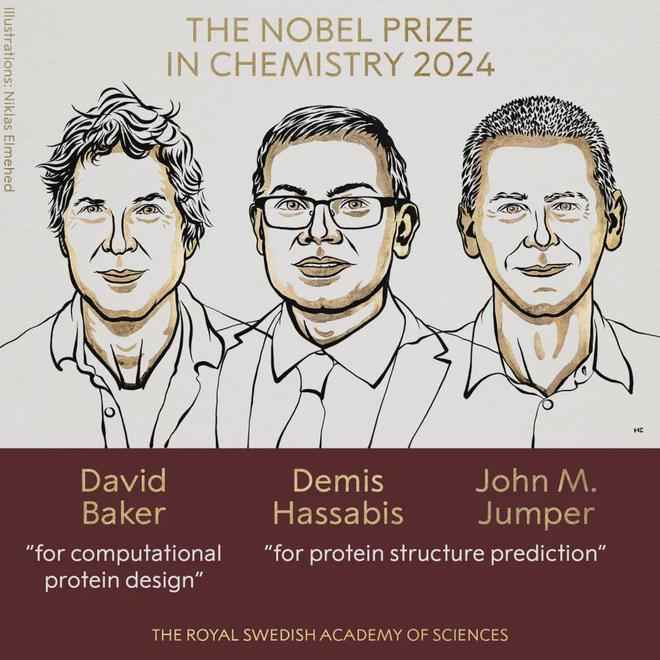
Official winning image of the 2024 Nobel Prize in Chemistry
On 9 October local time, the Royal Swedish Academy of Sciences announced that it had awarded the 2024 Nobel Prize in Chemistry to David Baker, Demis Hassabis and John M. Jumper for their contributions to the field of protein design and protein structure prediction.The three laureates received a total of 11 million Swedish kronor (approximately 7.45 million yuan) in prize money.
Demis Hassabis and John Jumper have successfully used artificial intelligence techniques to predict the structure of almost all known proteins. And David Baker mastered the building blocks of life and created entirely new proteins.
Demis Hassabis
Hassabis has long been known in international technology circles. Born in 1976 and raised in London, he began playing chess at the age of four and is known as the ‘Chess Prodigy’, taught himself programming at the age of eight, and reached grandmaster status at the age of thirteen. He graduated from the University of Cambridge with a double first in Computer Science, completed a PhD in Cognitive Neuroscience at University College London, and did post-doctoral studies at MIT and Harvard.
In 2010, he co-founded and became CEO of DeepMind with Shane Legg, who met him as a PhD student at University College London.In 2014, DeepMind was acquired by Google and operated independently under the Alphabet umbrella.In 2023, DeepMind merged with ‘Google Brain ‘In 2023, DeepMind merged with Google Brain and Hassabis was promoted to CEO of the combined Google DeepMind team.
John Jumper
Senior Research Scientist at DeepMind Technologies and first author of AlphaFold. He received his PhD from the University of Chicago, where his research focuses on using ML to model protein folding and dynamics, and was listed as one of the top 10 ‘important people’ in Nature's annual list in 2021.
David Baker
David Baker was born in 1962 in Seattle, Washington, USA, and is currently Director of the Institute for Protein Design at the University of Washington. He won the 2020 Breakthrough Prize in Life Sciences for his development of technology to design new proteins from scratch that have never appeared in nature, and for the first time used generative artificial intelligence to design a new antibody from scratch, which is expected to allow AI to design proteins from scratch to enter the market for antibody drugs, which is called the ‘originator’ of the field of protein design, and he has made the first proposal for the development of a new antibody in the field of protein design before DeepMind, which has been used for the development of the new protein. DeepMind earlier than the prediction and design of protein three-dimensional structure of the method, and even designed a protein structure design algorithm earlier than AlphaFold - RoseTTAFold.
Why protein folding?
As a substance supporting the basic life activities of human body, protein consists of 20 amino acids connected in a rosary-like manner to form a three-dimensional shape, and the shape itself determines the function of the protein, so the study of protein shape has always been a popular direction in the field of medicine.
Before AlphaFold, this was done experimentally. Crystallising proteins is very difficult, some proteins do not crystallise like membrane proteins, and months, even years, must be spent using expensive electron microscopes or X-ray crystal analysers to get the three-dimensional structure and visualise it. Countless PhDs have studied the folding of single proteins.
AlphaFold2, however, is able to predict the 3D structure of proteins directly from their amino acid sequences with atomic-level accuracy, and is believed to have solved the protein folding challenge that has plagued humanity for 50 years of history, rapidly advancing human understanding of fundamental biological processes and facilitating drug design.
In 2018, DeepMind announced its first-generation AlphaFold, which successfully predicted the most accurate structures of 25 out of 43 proteins in the 13th CASP competition, the ‘Protein Structure Prediction Olympics,’ outperforming 97 other competitors.
In 2020, DeepMind launched AlphaFold2, which is capable of predicting protein structures in a wide range of fields, and has already predicted the three-dimensional structures of more than 200 million proteins, which is the most important milestone contribution in structural biology, and is of pioneering significance for the subsequent research on protein structure and function, especially for the promotion of biopharmaceuticals. This was followed by AlphaFold-Multimer, which advanced the prediction of protein-protein complexes.
In May 2024, AlphaFold 3, a new generation of AlphaFold introduced by a team of researchers from Google DeepMind and Isomorphic Labs, appeared in Nature.AlphaFold 3 successfully predicted all living molecules (proteins, DNA, RNA, ligands, etc.). Compared to existing prediction methods, AlphaFold 3 found that proteins interact with other molecule types at least 50 per cent better, and even doubled the prediction accuracy for some important interaction classes.
Please specify source if reproduced2024 Nobel Prize in Chemistry | SCISOON

